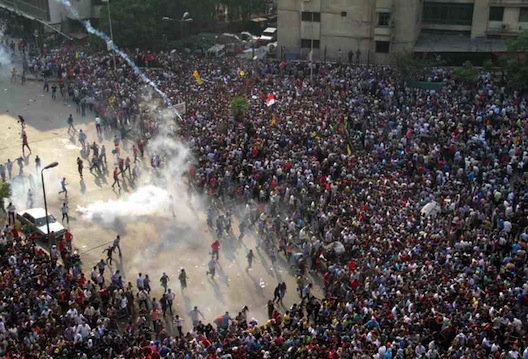
The commemoration of the fortieth Anniversary of the Sixth of October Victory, this year, is bittersweet. It has been sweet for the general population, celebrating the day with festivities, and activities organized by the army in the squares and skies of Egypt. Yet, a good day turned sour as events unfolded and clashes broke out between supporters of the ousted president, Mohamed Morsi, on one side, and residents of several neighborhoods and police forces on the other, resulting in a death toll of approximately fifty-one and over 200 wounded as per the Ministry of Health’s statement.
The Muslim Brotherhood-led National Alliance to Support Legitimacy called for a million-man march on October 6, to “reverse the coup,” spoil the army celebrations and occupy Tahrir Square as well as the site of their largest sit-in in the wake of Morsi’s ouster, Raba’a al-Adaweya. Meanwhile, Interim President Adly Mansour, in his speech commemorating the 1973 victory, invited Egyptians to “celebrate the 6th October in all squares of Egypt.” Hence, with pro-Morsi marches making their way towards Tahrir Square and pro-Army rallies already celebrating the day there, violence and confrontation were a feared, but inevitable outcome. Over fifty were killed across the country, over 200 injured, and well over 400 arrested, as anti- and pro-Morsi protesters, clashed.
Within the boundaries of Tahrir Square, however, a different mood pervaded. This year’s celebrations included fireworks, Sufi dancing, jets flying Egyptian flags and drawing hearts in the sky, reminiscent of the show put on by the armed forces after Morsi was removed from power on July 3. October 6 also saw a laser show and a major musical event attended by the president, the Minister of Defense Abdel Fattah al-Sisi, and the wife of the late President Anwar Sadat. Meanwhile, marching towards Tahrir square wearing yellow Raba’a shirts and carrying Raba’a flags, Pro-Morsi protestors chanted against the army and al-Sisi, promising to reverse the coup, reinstate Morsi and restore Egypt’s Islamic identity.
In a bid to prevent potential clashes between the increasingly polarized Egyptians, belonging to two very separate camps, who took to the streets, security authorities took a number of precautionary measures including: 1) closing off all major squares including Raba’a al -dawiya, Mehwar al-Shahid, Tahrir Square, as well as blocking roads leading to Itahediyah, the presidential palace; 2) Tanks and APCs were deployed near exit and entry points in strategic intersections and roads; 3) Metal detectors were set up at Tahrir Square entrances 4) Citizens entering the Square were searched for weapons and asked to show their t-Shirts to ensure they were not wearing any Raba’a marked garments. While clashes may have been avoided inside the square, that is definitely not the case in surrounding neighborhoods.
With the charged language emanating from both sides of the camp, an attempt to paint the ‘other’ as less patriotic or less deserving of the Egyptian citizenship, a successful transition to democracy is difficult to envision. Neither side appears willing to make any concessions. With over fifty deaths among its supporters, the National Alliance to Support Legitimacy and the Brotherhood are steadfast in their position, calling for renewed protests on Tuesday. As Egyptians were shot dead in the street, al-Sisi gave an impassioned speech about the army’s strength derived from the support of the people.
The fact is, a successful transition to democracy requires both the Muslim Brotherhood and the Egyptian government to realize that protesting is indeed a right, yet, it should not be viewed as the only means to restore or demonstrate power. The bloody events of today emphasize the need for alternative venues and channels where all parties are able to safely express views, make demands, negotiate, compromise and above all have a meaningful and candid dialogue. Setting aside the negative socio-economic impacts of ongoing protests, bloodshed needs to and indeed must stop. Over the past two years, Egypt has been and still is suffering from severe polarization if not division. It will run deeper if no proper transitional justice and accountability mechanisms are put in place and strictly executed.
Marwa Farid is a pro-democracy activist based in Cairo
Image: Photo: DNE
